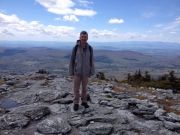
Gabriel Brownstein, 2003 PEN/Hemingway Award Winner for The Curious Case of Benjamin Button, Apt. 3W
Q: What inspired you to rework the title story and the other stories in you debut collection?
A: I was working on a bunch of autobiographical stories about the apartment building where I grew up, and more specifically a dear friend who had a hard life. At the time, I had a baby at home, so I worked on my projects at a writer’s space in New York. My project was not taking off, so I began taking books off the shelves at the writer’s space and reading them, and then—almost as a joke, I began reworking my autobiographical stories as revisions of famous stories. The first one I did was Hawthorne’s “Wakefield.” I think the second had to do with Kafka’s “In the Penal Colony.” The dark, spooky, magical stories seemed appropriate to the spookiness and magic of childhood. I stumbled on a copy of Fitzgerald’s “Tales of the Jazz Age” and discovered “The Curious Case of Benjamin Button,” which at the time was a pretty obscure story—it’s not in the standard selected Fitzgerald stories, and this was about a decade before the movie. It’s a weird story, a brilliant premise, but unusually clumsy for a Fitzgerald story, not at all the gemlike perfection I associate with him.
I think the time-going-backward theme of the title story fit with a lot of things I was thinking about: urban decay and New York City in the 1970s, remembering childhood. It just worked. So the book ended up being an anthology of lives, set in a magical version of the apartment building where I grew up. The apartment building felt like that when I was a kid: all these lives, behind all these secret doors, all of them weird and spooky and magical.
Q: Since Fitzgerald and Hemingway are kindred spirits, did you ever think about re-working a Hemingway story?
A: I didn’t. The stories I chose have a kind of overt magical element to them. I love Hemingway, and I think I’m profoundly influenced by him in certain ways, but I can’t think of a Hemingway story that offers the kind of whacked-out premise I was looking for back then.
Q: Why did you choose to matriculate to Oberlin?
A: I had a really cool camp counselor when I was a kid. I thought he went to Oberlin. I thought it was the place to go. I didn’t apply anywhere else. Turns out he went to Wesleyan.
Q: Was there anyone instrumental there in shaping your writing career?
A: Definitely. I didn’t take any creative writing classes when I was an undergraduate, but I had professors who encouraged me, and friends, and people who taught me a lot about writing and literature. I knew I wanted to be a writer. I don’t ever remember ever not wanting to be a writer. I wanted to be a writer when I was in elementary school. I found connection in books, and magic, and authority. Reading was revelatory for me.
Q: Was there a professor or classmate at Columbia (Brownstein holds an MFA in Fiction from CU) who guided you to a life as a writer and professor?
A: Yes. Robert Towers and Richard Locke. Towers, who was a novelist and critic, has passed away; Locke is also a notable critic and essayist.
Q: Do you remember the first Ernest Hemingway book that you read?
A: Yes, In Our Time. It is a great book.
Q: Do you have a favorite Hemingway book or story?
A: I love “Indian Camp”...it is such a brutal story. I like the Nick Adams stories a lot. My favorite Hemingway stories are about children and about war.
Q: Do you remember where you were when you received the phone call about winning the PEN/Hemingway Award?
A: I was on the Long Island Railroad coming home from work at SUNY Stony Brook. My editor called me with the news. The train was going from Hicksville to Jamaica. I called my wife, then my mother, and finally my agent. There was a guy with whom I worked sitting in front of me, when we got off at Jamaica together to change to the Brooklyn train, and I just blurted it out, “I just won the PEN/Hemingway Award.” He was nice about it. He said “It did sound like something big was going on back there.”
Q: Are you working on anything now?
A: Yes. A lot of things. I’ve published a bunch of short stories, and have some new ones, and there’s a longer work of fiction that I’ve been working on for a while, and now I’m writing a non-fiction book too.
Q: Where can fans read about your latest projects?
A: I try to keep up on Facebook and Twitter, and am always available through my St. John’s address.